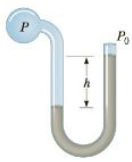PSL201Y1 Lecture Notes - Mean Arterial Pressure, Common Carotid Artery, Central Venous Pressure
Document Summary
The mean arterial pressure is the average aortic pressure occurring during a cardiac cycle. It is determined by heart rate, stroke volume and total peripheral resistance. Mean arterial pressure = cardiac output total peripheral resistance. Cardiac output = heart rate stroke volume. Therefore, map = heart rate stroke volume total peripheral resistance. The mean arterial pressure is the pressure that is needed to drive the blood through the system. If you have a low mean arterial pressure, you are unable to deliver the blood to the brain and the other organs that will be deprived of oxygen and nutriments. In the systemic circuit normally, the map is 90 mm of mercury. The central venous pressure is 0 mm of mercury. The pressure gradient driving the blood flow through the systemic circuit is the difference between the mean arterial pressure and the central venous pressure. Total peripheral resistance is whatever pressure that is resisting the blood from flowing.



